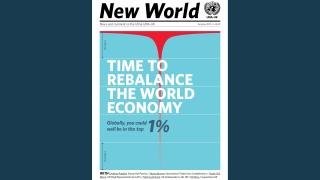
The UN General Assembly has declared 2012 to be the International Year of Cooperatives. From Argentina to Zambia, over 1m cooperatives across the globe will be demonstrating how they are helping to build a better world.
International years serve to draw attention to and encourage action on major issues. The International Year of Cooperatives is intended to raise public awareness of the invaluable contribution that cooperative enterprises make to poverty reduction, employment generation and social integration.
The International Cooperative Alliance, the voice of the global cooperative movement, is coordinating activities worldwide, with Cooperatives UK, the trade association in this country that campaigns for cooperation, leading British celebrations.
This is a truly unique year for the cooperative movement. It is an opportunity for every cooperative business in the world – from locally owned community shops to national brands – to show how they make a difference by pursuing economic viability and social responsibility. These businesses have proven that they can thrive and be sustainable, and the International Year pays tribute to their resilience.
Cooperatives are one of the world’s best-kept secrets. The number of cooperative businesses across the world is increasing steadily, with over 5,000 of them successfully trading in the UK and a staggering 1.4m worldwide.
In the UK, cooperative businesses contribute £33.2bn to the country’s economy. They have grown by 21% since the start of the financial crisis in 2008, outperforming the UK economy as a whole. So do cooperatives provide a model for sustainable growth in the future? There is certainly a strong case to be made.
Around 236,000 people are now employed by cooperative businesses, and 12.8 million own stakes in them – that is more than a fifth of the people living in the UK. Cooperatives UK’s annual state of the sector report, The UK Cooperative Economy 2011, documents the vital contribution that these businesses make. Results show that The Cooperative Group alone, ranked first on The Cooperative 100 list, has a turnover of over £12bn. Cooperatives are enjoying a renaissance – and not just in the UK.
Some people think of cooperatives as small, local enterprises and there are indeed thousands of organisations that fit that description. But many cooperatives are large and work at the national or regional level, while others are giants running global operations valued at billions of pounds.
Together, they have helped the cooperative movement to grow into an international economy, equivalent in value to the ninth largest in the world. 80% of Spanish olive oil is produced by cooperatives. So too is most of France’s Champagne and Italy’s Parmesan cheese. Cooperatives also account for all Fairtrade goods produced, enabling 887,000 smallholders in developing countries to earn a decent income.
A recent report by Cooperatives UK shows that globally, cooperative members outnumber individual shareholders three to one. Across the world, cooperative businesses have nearly 1 billion members and a turnover of $1.6trn, securing the livelihood of 3 billion people – nearly half the world’s population.
So, why are cooperative businesses so powerful and successful? Cooperatives are unique because they are owned and run by their members. They are democratic, allowing members to have an equal say in how the business is run. Rather than rewarding outside investors, profits are shared among the members.
Unicorn Grocery, a worker-owned cooperative in Manchester, is a perfect example of the resilient, cooperative business model in the UK. The business is non-hierarchical, offering a flat rate of pay, equal ownership and shared responsibility for the decisions that govern it. Members not only donate 5% of their wages to charity, but also offer advice to those wishing to learn about the way they work.
In the US, the well-established Ocean Spray cooperative has earned global recognition. The cranberry- and grapefruit-growing business was founded in 1930 by three farmers who were keen to expand the market for their crops through innovation. Today, Ocean Spray is owned by more than 600 farming families across North America.
Cooperatives thrive because they invest in people. Help us to raise awareness of this fantastic business model by supporting the 2012 UN International Year of Cooperatives.
Ed Mayo is Secretary General of Cooperatives UK, the trade association for cooperative businesses in the UK













